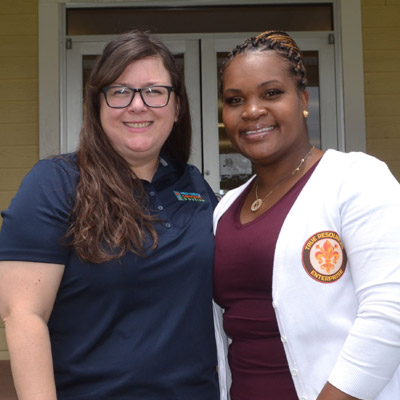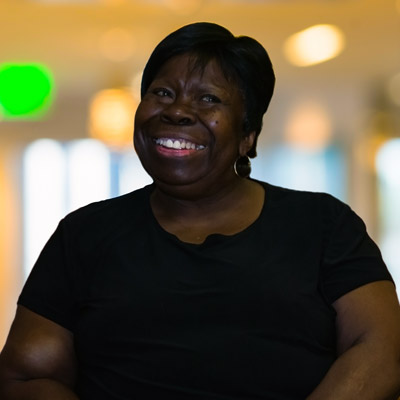In New Orleans, Louisiana, COVID-19 hit fast and early, following on the heels of Mardi Gras season. The city saw another coronavirus spike at the beginning of July. Meanwhile, the city has seen protests, largely peaceful, as people have cried out for racial equity. Terri North, president and CEO of Providence Community Housing, a NeighborWorks organization in the Crescent City, talked about her organization's challenges and problem solving — not just in making sure that residents have the resources they need, but also in ensuring that her organization and staff are able to continue to work productively to accomplish their mission and remain resilient.
The following are excerpts from that conversation:
What's happening?
"2020 has been a very challenging and unprecedented time. As many people know, Providence was born out of crisis with Hurricane Katrina, and I remember saying all these things about it being unprecedented times then. Now we're back in the same situation, where we feel we had made so much progress preparing for new things and then get hit with something completely unexpected, like COVID."New Orleans was affected early on — we were impacted early in the COVID outbreak emergency. And due to the worst timing possible, the COVID outbreak happened directly after Mardi Gras season when the city hosts tens of thousands of people, and our transit system is inundated with travelers from cities and countries across the world.
 "New Orleans is a hospitality and tourism economy, so restaurants and hotels have been closed; people aren't traveling. This time, due to extended stay-home mandates, a lot of restaurants are shuttering permanently. We're experiencing high unemployment among residents who live in the properties we've developed, who work in these sectors.
"New Orleans is a hospitality and tourism economy, so restaurants and hotels have been closed; people aren't traveling. This time, due to extended stay-home mandates, a lot of restaurants are shuttering permanently. We're experiencing high unemployment among residents who live in the properties we've developed, who work in these sectors."Louisiana's tax base has taken a big hit and it's hard for the state and city to come up with the resources to help all who need it. The stimulus has helped, but it's scary for a lot of people. The foundation of our economy relies on hospitality and tourism, so there are a lot of people who have been affected. Many middle-class individuals who work within hospitality and tourism are affected as well. Some projections have no corporate conventions, conferences or trade shows planned through mid-year 2021. That affects a lot of companies and a lot of individuals. Our low-income and gig workers being among the most impacted.
"Unfortunately, we've lost residents, we've lost employees of our property management companies. And as you know, due to health disparities, people of color and people in low-income neighborhoods are affected even more. It's been really rough.
"We've had good results keeping lines of communication open between Providence and our property managers and residents. We're coordinating food assistance efforts and have set up an emergency rental assistance fund. Our property managers and resident service coordinators have been in direct contact with residents, addressing their needs and identifying key resources of support during this time. We're currently working on ensuring that each resident has a reusable mask."
The fight for racial equity
"New Orleans' history is steeped in slavery and the slave trade. Our previous mayor faced pressure and backlash at the end of his last term when trying to institute the removal of Confederate statues in the city. The removal of Robert E. Lee was the most pronounced. As general of the Confederate states, Lee's statue was a symbol of divisiveness. The mayor was determined to set a better path of inclusiveness in our city and this effort was symbolic. It raised backlash, and through backlash, communication and conversation. People were seeing the tide shift, and it was real."We've had ongoing protests in the city for some time. There's a different vibe here. The protests, for the most part, have been diverse and peaceful. It's a movement … I've seen a lot of interaction among diverse community groups trying to reach out and understand one other better.
 "As an organization, we had a pretty quick response to the stay-home orders. One of the first things we did was institute a work-from-home policy. Our resident services team, in quick order, developed a plan for virtual office hours and communication with residents via email, text and phone calls. Daily emails began to be circulated to keep residents updated on resources and information. The board met and approved allocating funds to establish an emergency rental assistance fund. We utilized funds from our NeighborWorks COVID grant to leverage dollars for the fund. Two giving days were held 'virtually' and funds from those efforts went directly to supporting our residents services work.
"As an organization, we had a pretty quick response to the stay-home orders. One of the first things we did was institute a work-from-home policy. Our resident services team, in quick order, developed a plan for virtual office hours and communication with residents via email, text and phone calls. Daily emails began to be circulated to keep residents updated on resources and information. The board met and approved allocating funds to establish an emergency rental assistance fund. We utilized funds from our NeighborWorks COVID grant to leverage dollars for the fund. Two giving days were held 'virtually' and funds from those efforts went directly to supporting our residents services work. "We have been working on piloting and trying to standardize a resident service coordination model. We brought in partner organizations to provide extended services at a couple of our sites we identified as needing additional service support. It was always an intent, but we sped up the process to make sure people had somewhere to go to help them navigate all of the information coming from the city, state and federal level. We compiled resource guides, telling residents where to go for assistance, alerting them of CDC guidelines and letting them know the suggested medical advice to take care of themselves. We worked with the city to make sure residents had access to reusable masks. And we also made sure, while we were doing all of this, that people were preparing for hurricanes; after all, in the midst of everything, it's hurricane season."
Faster and faster
"Establishing the emergency rental fund was important to Providence."The service coordinators are doing a lot, but at an accelerated pace with more urgency around them. We're working with health navigators to make sure our residents have the opportunity for virtual health screenings and connecting with the Urban League to get out voting and census information."
Lessons learned
"Remote working was something we'd given some thought to, and we had just made a major technology purchase to update our outdated equipment, so everyone had just received a laptop for work and that helped make the transition to remote working a bit easier. We purchased Zoom licenses for each department and accelerated the use of Microsoft Teams for internal communication. We are just beginning our return-to-work efforts as we continue to monitor the changing conditions in our community. All in all, it seemed to work pretty well."The racial justice movement gave me the opportunity to look back at how we were founded. We've always been on the social justice front, trying to make sure residents are not displaced and are treated fairly. I'm not sure we've always done a good job of making sure all of our board and staff truly understand things from that perspective. Now we're communicating much better."

